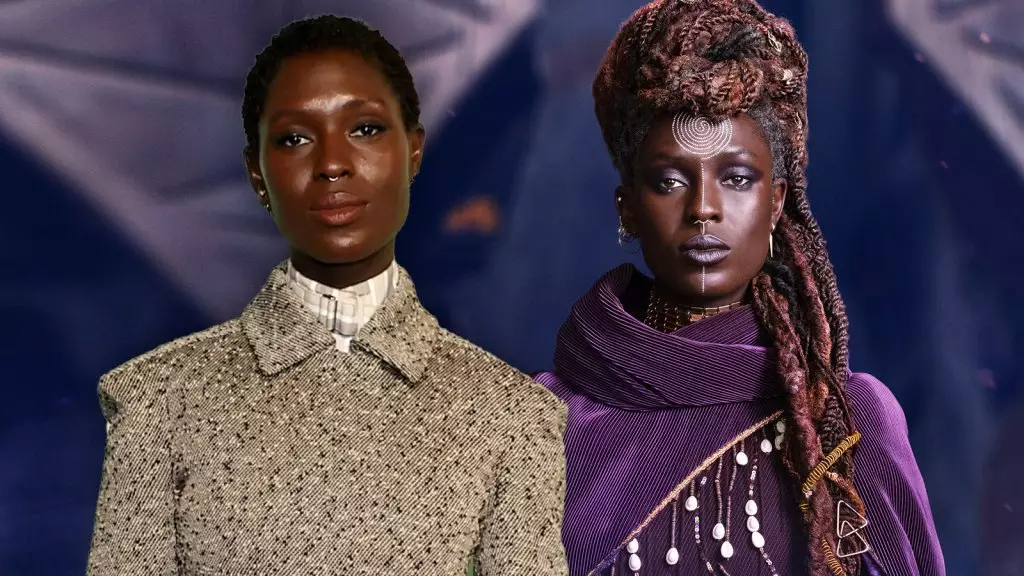In the recent wave of celebrity discussions surrounding online harassment, Jodie Turner-Smith’s candid remarks regarding her co-star Amandla Stenberg deserve a critical examination. Turner-Smith, who portrayed Mother Aniseya in the Disney+ series, “The Acolyte,” has openly challenged Disney’s inadequate response to the cyberbullying that Stenberg faced. This discussion raises essential questions about the responsibilities that large entertainment corporations have toward their talent and the reactions they should exhibit against online injustices.
Turner-Smith’s assertion that studios should actively defend their stars against Internet hostility unveils an urgent conversation regarding the safeguarding of individuals within the industry. The entertainment landscape has become a breeding ground for violent rhetoric and hateful comments, particularly aimed at marginalized groups. The topical nature of this dialogue illustrates not only the current climate surrounding race and representation but highlights an ongoing failure within major studios to tackle these problems definitively.
The lack of a robust stance from Disney in response to the backlash aimed at Stenberg is emblematic of a broader issue. Turner-Smith’s words resonated with many in the industry who feel that silence in the face of bullying can perpetuate a culture of fear and intolerance. “It’s just not fair to not say anything,” she expressed, emphasizing the ethical responsibility organizations have to protect their cast and crew from toxicity.
Moreover, the emphasis on profit over principles is a debilitating aspect of corporate culture. Turner-Smith’s call for Disney to take a definitive stance reveals a disconnection between the company’s financial interests and the moral obligations they should acknowledge. As she pointed out, a significant portion of their audience consists of people of color who hold considerable economic influence, suggesting that taking a stand against racism could, paradoxically, attract more goodwill within diverse communities.
Amandla Stenberg’s subsequent expressions of pain and frustration convey the emotional toll of such relentless scrutiny and hate. In her own words, Stenberg described the “hyper-conservative bigotry” encountered even before “The Acolyte” premiered. This sense of being marginalized in a space meant for creativity forces a confrontation with the realities of being a public figure in an age where anonymity allows for unchecked aggression.
Stenberg’s attempt to reclaim the narrative through music reflects a vital method of processing trauma; her artistry becomes not just an outlet, but a form of resistance. By utilizing her platform to address intolerable racism, Stenberg exemplifies how celebrities can pivot from victimization to empowerment, and how they choose to voice their experiences amid adversity. This approach underscores the necessity of creating art as a response to cultural injustice—an assertion of identity amid ruinous forces.
While individual acts of defiance against racism, such as those displayed by Turner-Smith and Stenberg, are crucial, there rests an implicit demand for a more collective approach. The commentary from Turner-Smith incites not just a dialogue among fans and commentators but mandates that established industries reformulate their response frameworks.
As we move forward, it becomes increasingly clear that the responsibility for change must not solely lie on the shoulders of those impacted by hate or disparagement. Studios, networks, and corporations must invest in robust protocols to protect their artists and engage with their audiences on issues of race and inclusivity. Only through systemic change can we begin to dismantle the oppressive structures that allow bullying and racism to flourish unchecked.
Jodie Turner-Smith’s criticisms, resonating through the halls of Hollywood and beyond, serve as a vital reminder that the silence of powerful entities can no longer be tolerated. It compels a push for accountability in the entertainment industry and advocates for the right of every artist to exist free of online vitriol, fostering a culture where support and ethical responsibility prevail.

